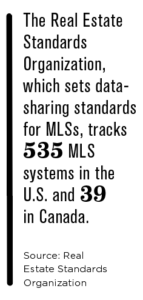Multiple listing services (MLS) provide real estate agents with great data and value in today’s market
By Michelle Huffman
As the dust settles on the National Association of REALTORS® lawsuit, real estate agents and multiple listing services are rewriting the procedures and processes they must follow to comply with the settlement.
 However, many aspects of the MLS remained unchanged. The MLS still represents one of the most comprehensive, standardized and transparent real estate marketplace systems in the world.
However, many aspects of the MLS remained unchanged. The MLS still represents one of the most comprehensive, standardized and transparent real estate marketplace systems in the world.
“The MLS has been, and will be, the source of the open, clear and competitive marketplace for the real estate professional community,” says Rene Galicia, EVP of customer advocacy at Bright MLS, a Maryland-based multiple listing service. “Without the MLS, fair housing falls short, and the marketplace becomes disjointed, less efficient and more costly for buyers and sellers.”
How MLSs have changed post-settlement
The terms of the NAR settlement reached in March require MLSs to adopt and enforce a new set of rules. These rules prohibit the publication of offers of compensation from the seller or seller’s broker on the MLS and require MLS participants working with buyers to enter into written agreements with their buyers before touring a home, a move NAR has long advocated for its members.
Discussions and negotiations surrounding offers of compensation can still happen but must now take place outside of MLS systems. While this may mark a big change for some agents, others like Alexis Bolin, CRS, associate broker at KW Gulf Coast-Keller Williams in Pensacola, Florida, feel that these changes ultimately won’t make a big difference.
“The whole purpose of the MLS is the dissemination of information between brokers and agents, period. That’s the reason it was developed,” she says. “The MLS is not just all about compensation split.”
Bolin points out that when she first received her license in the late 1970s, no offers of compensation were published in the MLS, “and we got along just fine, and we will now.”
The benefits of the multiple listing services
Bolin and other experts claim that the MLS is just as valuable as ever, and a resource that strengthens the market in a time of upheaval.
“The core value of MLSs—providing accurate and comprehensive market data—remains essential to our business,” says Elisa Cho, CRS, broker/owner at Echo Realty in northern New Jersey. Using multiple listing services offers several benefits that all real estate market players can reap.
1. They provide the most comprehensive database of property listings available.
Not only does the MLS consolidate all listings and property information in one place, it also consolidates buyers and sellers. Stuart White, president and CEO at Tennessee-based MLS provider Realtracs, Inc., calls it the “network effect” in an Inman opinion article. “The network effect has provided a dependable listing and buying network—creating a singular destination where an area’s buyers and listings are in the same place.”
Without a widely adopted MLS, listing information would be fragmented among different brokers, different websites or different MLSs, forcing agents to go from place to place seeking property information in an inefficient process that is still used in other parts of the world, Galicia says. This can lead buyers to miss out on their dream home and sellers to miss out on pools of buyers.
 2. They foster transparency and trust in the market.
2. They foster transparency and trust in the market.
Nearly every property available for sale is listed on an MLS, and “this transparency empowers consumers to make informed decisions and navigate the real estate market with greater confidence and efficiency,” Cho says. “By ensuring that all participants have access to the same data, MLSs help prevent misinformation and create a level playing field.”
The smallest brokerage in town can compete with the biggest multi-state firm, allowing buyers to work with the professional of their choice, knowing they have access to the largest pool of properties for sale in the marketplace, NAR says. To this end, MLSs also uphold fair housing laws by ensuring equal access to the same information for all people, regardless of their backgrounds.
3. Standardized data that facilitates easy comparison and healthy competition.
With access to large, accurate quantities of data about properties, agents representing buyers or sellers can easily compare properties and conduct effective market analysis. Sellers can see all the other properties on the market, and their agents can set the most effective price point using up-to-date pricing data and trends. Buyers’ agents can write better offers because they have the data available to see how comparable homes sold. This helps maintain an appropriately competitive marketplace environment.
Where MLSs stand to improve
“While MLSs are highly valuable, there are areas for improvement,” Cho says.
She points to the need for enhanced user interfaces for better usability and increased accessibility, an idea supported by White: “By making their products more accessible, MLSs reinforce their role as indispensable tools and empower users to achieve their goals with ease,” he writes.
Both also say that better data accuracy is key to future progress, with Cho adding that more “robust integration with emerging technologies like AI and big data analytics” would be a welcome upgrade.
For now, the industry is working through enacting the new rules dictated in the settlement, while maintaining and supporting the integrity of the MLS that is so important to the real estate market.
“We are all working together now to pivot,” Galicia says. “There’s no going back, and we are working together to embrace the new way and not try to keep the old one.”
The Origin of the MLS
Although the modern digital MLS is just a few decades old, the idea of the MLS dates to the 1800s when real estate brokers would meet at their local association offices to share information about the properties they were trying to sell. They agreed to compensate the brokers who helped sell those properties, and the first MLS was born “based on a fundamental principle that’s unique to organized real estate: Help me sell my inventory and I’ll help you sell yours,” according to the National Association of REALTORS®.
Source: National Association of REALTORS® MLS site
Unlock more MLS knowledge with our recording, MLS Uncensored: Top 8 Listing Myths with Cara Ameer at www.CRS.com/education/education-catalog.








